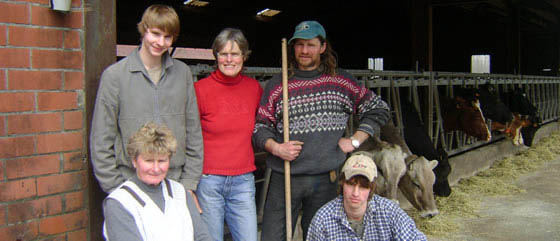A farm where three generations share the work has almost become a curiosity. This is the case of De Zwaluw in Lovendegem, which also combines innovation and long-term vision with a fair and ecological way of working. A dream partner for the organic food wholesaler Biosano, which produces fair trade milk and milk chocolate under the Biodia label.
Being 21 years old at the head of a large farm is not something that everyone can really afford. And yet Nils Mouton does not boast in the least of his career leap. “I took over my father’s farm in 2010. I am already the fourth generation in a row to do so. At the moment, both my grandmother and both my parents, my partner and I are working together. It’s as if there is a kind of cooperative within the family. Without them, I wouldn’t have been able to hold out. »

Until 1998, De Zwaluw was a ‘common’ farm, but due to a combination of circumstances it was decided to switch to organic products. “One of the reasons is that at that time swine fever was detected on a farm in the neighbourhood, which meant that our pigs also had to be destroyed. My father started thinking very consciously about how we work. He is very open to innovation and he is convinced that you have to change the way you work if it is no longer profitable or workable. Although as an organic farm we would not be able to escape any clean-up afterwards, he did take the step”.
De Zwaluw is one of the 24 members of Coöperatie BioMelk Vlaanderen. Every year, its members collect approximately 6 million litres of milk, which they process and transport in consultation with all farmers. Together they strive for a fair milk price by trading the product partly together. Many farmers combine this with home processing, because this way they can best valorise their milk and have direct contact with the consumer.
One of their partners and regular customers is Biodia, a Biosano project. Mieke Lateir, responsible at Biosano, tells the story behind this wholesaler in organic food. “The idea behind Biodia grew partly from collaborations that business manager Lode Speleers had with Italian farmers. He has been doing business for some time with a cooperative of about a hundred pasta producers. They determine their price on the basis of the production costs they have and the quantity of grain they harvest, regardless of the world market price. The price also includes risk margins that protect the members of the cooperative against, for example, crop failures due to weather conditions”.
Price calculation model
Gradually, the idea of doing something similar in Belgium arose. At that time Lateir was working for Vredeseilanden. “Following the example of the pasta farmers, we set up Biodia. Vredeseilanden then developed a set of specifications in which the whole price story is discussed in detail. Biodia wants to pay a fair price to the milk suppliers in the hope that other customers will adopt this method. The price is determined on the basis of the cost price model of expert Wim Govaert and is recalculated annually. In 2011 it was 44.52 eurocents per litre of milk. This year it will rise to 45.10 eurocents per litre. The reason for this is very concrete costs such as an increase in the price of straw. We are not just basing ourselves on the model, but the farmers themselves are also involved and have a say”.
Mouton is a staunch supporter of the price calculation model and thus also of fair trade. “The uniqueness of this concept is that it takes account of all the links in the chain. If one party encounters problems due to unforeseen circumstances, the others must respect this. In this way, the financial picture is right for every company and everyone can continue with their vision and business operations. Nobody works for nothing, is exploited or undermined. That is why we refuse to cooperate with farmers who would have excessive margins. The market price is fair because it is calculated on the production costs that each member of the Cooperative incurs to produce milk and not on percentage margins”. Lateir adds: “Biosano also gets a fair price for its processed milk. Once again, it is about production costs, taking into account, among other things, transport and marketing costs, which is much fairer than working with percentage margins”.

Choosing sustainability
Sustainability is about more than just fair trade, which is why Biodia’s specifications include many sustainability criteria. “These include promoting the use of local proteins, reducing the use of antibiotics and promoting biodiversity from 2015,” explains Lateir. Mouton concretises: “In addition to self-harvesting for our vegetables and organic way of growing cattle, we also apply nature grazing in cooperation with the Nature and Forest Agency and the city of Ghent. This means that we graze our animals, in this case sheep, created or already existing nature reserves such as the verges along the Coupure and the Watersportbaan in Ghent. It is a win-win situation because nature is maintained and at the same time we earn something from it. Moreover, it is a nice sight for passers-by. Thanks to nature grazing, I can now keep as many as 300 sheep, because this method of working does not involve any costs for fencing, ground lease or the like. After all, grazing sheep on farmland does not make any difference.
Any choice in favour of sustainability also has an economic consequence, emphasises Lateir. According to Lateir, the biggest difference with ‘mainstream’ companies is the long-term vision that fair trade companies adhere to. Mouton says: “In 2012, milk prices were low and those of concentrates very high. Then we decided to give the cows mainly grass and dried clover (roughage), supplemented with a minimum of concentrates. Milk production was much lower, but much cheaper. Moreover, the cows were much more fertile, making it less difficult to inseminate them. In addition, they were less prone to exhaustion and had fewer leg problems. For us, this method of working is profitable in the long term, because the animals will live longer, we have to put in less man-hours and we can invest those hours in our other industries. Thanks to this distribution of income, we will never really get into trouble when things are not going so well in one particular branch. In addition to the production of milk, some of which we process here and some of which is purchased by the Cooperative, we grow vegetables and keep sheep and pigs. An organic farmer with whom we had a partnership once offered us far too low a price for our vegetables. Instead of selling them below the price, we decided to feed them to the animals. We prefer the sustainable solution. A company can only successfully pass from generation to generation if it works in a sustainable way. If De Zwaluw persists in this way, my children will also be able to take over the business and continue it with peace of mind”.


